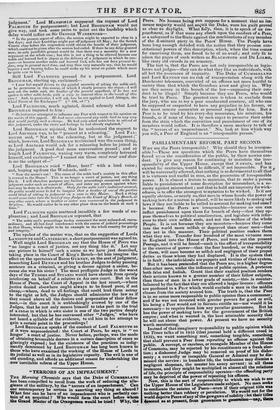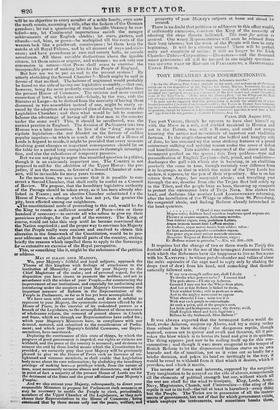PARLIAMENTARY REFORM, PART SECOND.
WHY are the Peers irresponsible? Why should they be irrespon- sible P—These are questions which the Peers have themselves forced upon the consideration of the public, by their unwise con- duct. To give any reason for continuing to maintain the irre- sponsibility of the Upper House, except that it exists, and has existed for centuries, would be difficult, if not impossible. For it e, will be universally allowed, that nothing is so detrimental to all that it is virtuous and useful in man, as the possession of irresponsible power. It is almost a truism to maintain, that to make a person liable to punishment of some description for misconduct, is a se- curity against misconduct ; and that to hold out impunity for wick- edness, is to offer the strongest temptation to be wicked. Is it not equally obvious, or nearly so, that men in whose hands the power of making laws for a nation is placed, will be inure likely to tnakeg ood laws if they are liable to be called to account for making bad ones ? is because the Peers are irresponsible—because no one can inflict punishment upon them for breach of duty—that they op- pose themselves to political amelioration, and legislate with refer- ence to their own selfish ends, and not the welfare of the whole People. It is not because they are monsters—because they come into the world more selfish or depraved than other men—that they act in this manner. Their political position makes them what they are. Transfer four hundred of the most virtuous men in England into the House of Peers, and turn out the present Peerage, and it will be found—such is the effect of irresponsibility in the exercise of power—that the four hundred, or the majority of them, will soon become as selfish and negligent of their proper duties as those whom they had displaced. It is the system that is in fault ; the individuals are puppets and victims of that system. But it has been pretended that the Peers are, in a higher degree than other men, under the influence of public opinion. A pretence both false and foolish. Grant that their exalted position renders their actions known to a greater number of their fellow subjects, than those of men in a lower grade of society,—this is counter- balanced by the fact that they are allowed a larger licence : offences are pardoned in a Peer which would exclude-a man in the middle classes from the society around him. The truth is, that the Peer is in no sense more responsible to public opinion than a commoner; and if he was not invested with greater powers for good or evil, his being a Peer would not in fairness entitle us—nor would it be necessary— to require from him any peculiar guarantees. But he has the power of making laws for the government of the British empire; and what is wanted is, the best attainable security that he will not abuse that power. At present we have no security worth mentioning. Instead of that-imaginary responsibility to public opinion which the Times talks of in 1835 (that journal held a different creed in 1832), we want something real, something tangible, something that shall prevent a Peer from repeating an offence against the public. A corrupt, or careless, or renegade Member of the House of Commons, may be rejected by his constituents on a fresh elec- tion; a dishonest Judge may be removed on proof of his disho- nesty ; a cowardly or incapable General or Admiral may be dis- missed the service: in humbler life, the tradesman may dismiss a negligent shopman, the master his saucy servant: in all these instances, and they might be multiplied in almost all the relations of life, the principle of responsibility operates—the offending party may be deprived of the power of repeating his offence. Now, this is the sort of responsibility to which we wish to see the Upper House of the Legislature made subject. No man seeks to confiscate the estates of Peers—even if their original title was nothing better than robbery or peculation. We would not for the world deprive Peers of any of the gewgaws of nobility.: let their titles descend as at present, from generation to generation—nay, thew will be no objection to every member of a noble family, even unto The tenth cousin, assuming a title, after the fashion of the German grandees; let not a quartering of their heraldic blazonry be cur- tailed—nay, let Continental importations enrich the meagre achievements of our English shields ; let stars, garters, and ribands—re(1, blue, or green—be multiplied till the coats of the wearers look like a patchwork counterpane ; let them keep the entrée at all Royal Palaces, and by all manner of ways and stair- cases; and have precedence at race and county balls, in seecula sercularum. All these enviable distinctions above the ignoble citizen, let them retain or acquire, and welcome : we ask only one concession in return—that Peers shall cease to exercise the irresponsible power of making laws for the People of England. But how are we to put an end to the present system ? By utterly abolishing the Second Chamber ?—Much might be said in fhvour of that method. The balance of argument would probably be found on the side of having one legislative assembly,—that one, however, being far more perfectly constructed and regulated than the present House of Commons. The revision and more careful concoction of laws, which are said—falsely, by the way, vide the Statutes at Large—to he derived from the necessity of having them discussed in two assemblies instead of one, might be easily se- cured by the adoption of an improved plan of doing businees in the Legislative Chamber ; and then what would be left to counter- balance the advantage of having all the best men in the country under the same roof? This, it should be recollected, was the ancient practice in England. The division of Parliament into two Houses was a later invention. In lieu of the " drag" upon pre- cipitate legislation—the wet blanket on the fervour of sudden popular impulses—in which so much of the virtue of a houseof Lords is feigned to reside, it might be provided that every measure involving great changes or important consequences should lie on the table for a period long enough to insure its thorough investiga- tion, and also the subsidence of temporary passions.
But we are not going to argue this unsettled question in politics, though it is an extremely important one. The Country is not prepared to call for the abolition of the Upper House: the pre- judice, if not the reasons, in favour of a Second Chamber of some sort, will be invincible for many years to come. In the mean time, we may assume that it is possible to con- struct a Second Chamber, that shall really be useful as a Council of Review. We propose, that the hereditary legislative authority of the Peerage should be taken away, as it has been already abo- lished in France; and an elective Chamber substituted t 1- the House of Peers,—a change which has not yet, the greater the pity, been effected among our neighbours. The constitutional mode of proceeding to this end, would be for the King to create a sufficient number of Peers—two or three hundred if necessary—to outvote all who refuse to give up their pernicious privilege, for the good of the country. The King, of course, would not take this step until he became convinced that the Nation required it ; and the proper way to convince his Majesty that the People really were anxious and resolved to obtain this alteration in the framework of the Constitution, would be to pre- sent addresses on the subject from all parts of the country, stating briefly the reasons which impelled them to apply to the Sovereign for so extensive an exercise of the Royal prerogative.
This, or something like it, might be the substance of the petition or address.
MAY IT PLEASE YOUR MAJESTY, We, your Majesty's faithful and loyal subjects, approach the Throne of this kingdom with feelings of attachment to the institution of Monarchy; of respect for your Majesty as the Chief Magistrate of the realm ; and of personal regard, for the disposition you have shown to promote the welfare, and act in accordance with the wishes of your People,—for commencing the improvement of our institutions, and especially for authorizing and introducing under the auspices of your Majesty's Government the important measure of Reform in the Representation of the People in Parliament, so far as it has yet been accomplished. We have seen with sorrow and alarm, and deem it neEdful to represent to your Majesty, the systematic resistance offered by the House of Peers, in the exercise of its undoubted powers as a branch of the Legislature, to the accomplishment of those measures of wholesome reform, the removal of proved abuses in Church and State, which we through our Representatives have called for ; which your Majesty's Ministers have, in compliance with our demand, matured, and submitted to the consideration of Parlia- ment; and which your Majesty's faithful Commons, our Repre- sentatives, have sanctioned.
Deploring the continuance of this state of things, by which the progress of good government is impeded, our rights as citizens are withheld, and the peace of the country is menaced ; and desirous to remove the evil by those lawful means which the Constitution has provided ; we earnestly pray that your Majesty will lie graciously pleased to give to the House of Peers such an increase of en- lightened and virtuous members, as shall enable that Legislative body to set about its own reformation ; by abolishing the hereditary privilege of making laws—a privilege which, from the nature of man, must necessarily occasion abuses and discontents, and which ID point of fact a majority of the present House of Lords use for the detriment of the State and the great affliction of your Majesty's People.
And we also entreat your Majesty, subsequently, to direct your responsible Ministers to propose for Parliament such measures as may be necessary to enable the People to elect, periodically, members of the Upper Chamber of the Legislature, as they now choose their Representatives in the House of Commons ; being - convinced that by these means only can the peace, welfare, and
prosperity of your .Majesty's subjects at home and abroad te secured.
There is no doubt that petitions or addresses to this effect would, if sufficiently numerous, convieee the King of the necessity of adonting the steps therein indicated. The time for action is arrived. Our weary Representatives will soon be released from their long labours; but the wurk of the People will then be only beginning. It will be a stirring recess ! There will be perfect unity and simplicity of action: it will no longer be the Irish Church—Tithes—Corporations —Dissenters—and the thousand minor grievances: all will be merged in one mighty question— THE SECOND PART OF REFORM IN PARLIAMENT, A RESPONSIBLE UPPER HOUSE.



























 Previous page
Previous page